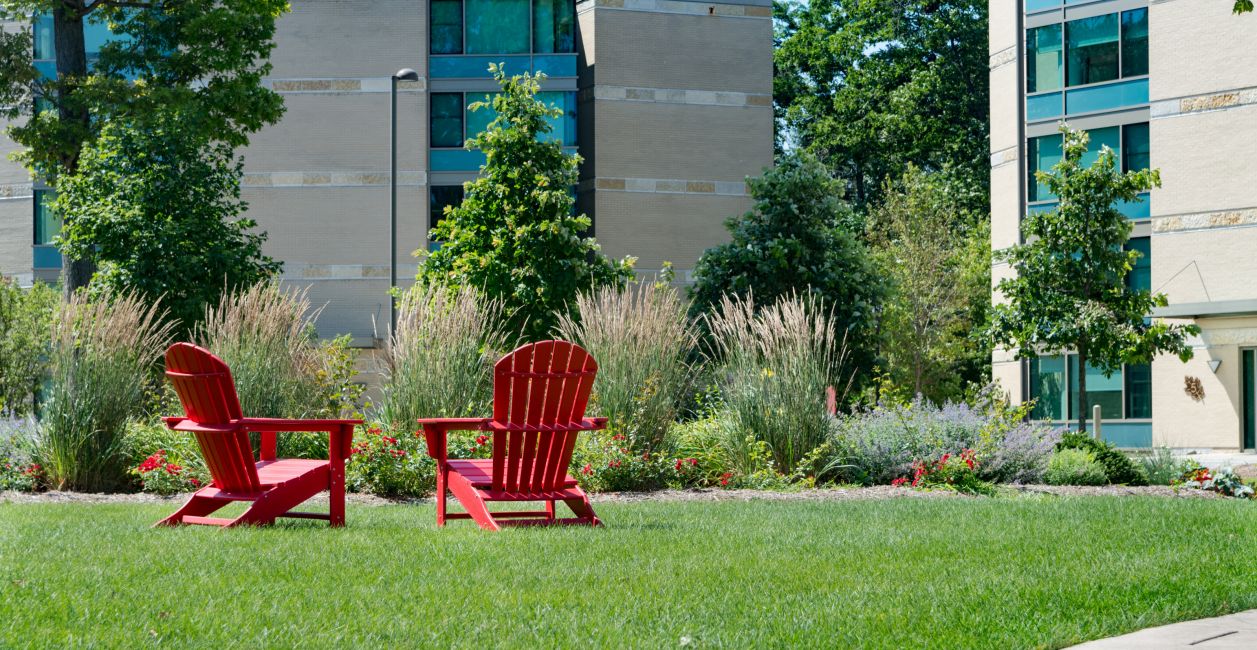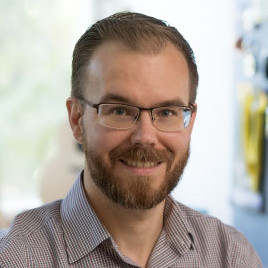
Robert Nagel

Robert Nagel
- Director of Engineering; Professor of Engineering
Carthage Director of Engineering Robert Nagel came to Carthage in 2022 from James Madison University, where he is a professor in the Department of Engineering and a leader for their partnership with Kern Entrepreneurial Engineering Network (KEEN), a national network centered around the common goal of fostering curiosity, connection making, and value creation in engineering education. Prof. Nagel has held national leadership roles in both the American Society of Mechanical Engineers (ASME) Design Education Conference (DEC) and American Society of Engineering Education (ASEE) Design in Engineering Education Division (DEED).
Hear from Prof. Nagel: Why Engineering?
“When I think back to my childhood, I remember that I was always putting things together — either modifying toys or making new ones. One memorable childhood experience happened one year around Christmas, when my family brought out the Christmas train layout. While I was in elementary school, my father had taught me the difference between parallel and serial wiring. I used this knowledge to wire street signs and lights all over our Christmas train layout. When my father came home, I proudly told him that the lights were wired in parallel. Later, I built a 64-square-foot train layout in my parents’ basement. This early play at design set the foundation for how I approach engineering education: Learning is discovery. Like how my family provided me space for self-directed learning, I too now provide similar spaces for my students, whether in the classroom or in the research lab as we work together to discover new knowledge.
“I am an engineer, an educator, a scholar, and a mentor. For me, design is the crux of engineering, and engineering design is integrative; it is exploratory; it is purposeful; it is value creating. As a teacher and a scholar, I apply this lens of engineering and design to improve what I teach, how I teach, and where I teach. I create educational experiences that mimic engineering practice, giving students opportunities to learn engineering by doing engineering.
“Toward this goal, I create cohort-wide project experiences with teaming based on system architecture to minimize competition and maximize collaboration. I create enterprise project experiences through capstone featuring near-peer mentoring and student-driven documentation needs. I incorporate real, industry projects, having partnered with Northrop Grumman, General Motors, Wilson Workforce and Rehabilitation Center, and Stanley Black & Decker in curricular courses, independent studies, capstone, and elective courses. And I collaborate with faculty in engineering and beyond: communication studies, industrial design, occupational therapy, kinesiology, and music education to create cross-disciplinary learning experiences encouraging student curiosity and connection making to create real value.
“Outside of work, I enjoy spending time with my family, sitting buried in a book, or lost tinkering on a project in a makerspace.”
- PhD in Mechanical Engineering — Oregon State University, June 2010
- M.S. in Mechanical Engineering — Missouri University of Science and Technology, Dec. 2006
- B.S. in Mechanical Engineering — Trine University, May 2005
- Introduction to Engineering Design
- Computational Reasoning with MATLAB
- Managing Engineering Ventures
- Visualization and Modeling Engineering Project I and II
- Senior Capstone
- How the understanding of engineered systems influences the ability to learn design.
- How hands-on making enhances one’s education in engineering and design.
- Omnidirectional Faculty Mentorship through Entrepreneurially Minded Learning Community Circles — funded at $100,000 through Arizona State University and the Kern Family Foundation from Oct.1, 2021 through Sept. 30, 2023.
- Identifying the Interplay of Expertise Development, Creativity, and Learning in University Markerspaces — funded at $156,263 through the National Science Foundation from Sept. 1, 2017 through Aug. 31, 2022.
- Evaluating the Impact of Teaching Function in an Engineering Design Curriculum — funded at $154,980 through the National Science Foundation from Oct. 1, 2015 through Sept. 30, 2020.
- University Maker Spaces: Discovery, Optimization and Measurement of Impacts — funded at $75,881 through the National Science Foundation from Sept. 1, 2014 to Aug. 31, 2018.
- Creating an ecosystem of curricular and co-curricular programs that support innovation and creativity at an undergraduate institution, — funded at $2,000 through VentureWell, Oct. 11, 2016 through March 25, 2017.
- Innovation Leadership: Training students to be drivers of change, — funded at $1,800 through VentureWell from Nov. 2014 through Dec. 2015.
- Implementing a Product Failure Knowledge Management System — funded at $14,000 through General Motors Company from Dec. 2, 2013 through Dec. 31, 2016.
- A Contextual Approach to Researching and Teaching Sustainability — funded at $431,202 through the National Science Foundation from April 1, 2012 through March 31, 2017.
- Summit on Global Sustainability in Engineering Education: Developing Knowledge and Planning for Strategic Processing — funded at $47,283 through the National Science Foundation from Sept. 2015 through July 2016.
- Using Customer Perception of Failure and Function as Indicators to Actual System Failure — funded at $30,982.09 through General Motors Corporation from May 1, 2013 through Sept. 22, 2014.
- Research into the Design and Development of a Campus Composting Facility — funded at $15,000 through the Environmental Protection Agency P3 Award Program from Aug.15, 2011 through Aug. 14, 2012.
- Alemán, M. W., Tomko, M., Linsey, J. S., and Nagel, R. L., “How Do You Play that Makerspace Game?: An Ethnographic Exploration of the Habitus of Engineering Makerspaces,” Research in Engineering Design, 33, 351–366
- Tomko, M., Aleman, M., Newstetter, W., Linsey, J., and Nagel, R., 2022, “A Methodological Roadmap for Phenomenologically Based Interviewing in Engineering Education: Identifying Types of Learning in Makerspaces,” Studies in Engineering Education, 2(1)
- Tomko, M., Alemán, M., Nagel, R., Newstetter, W., and Linsey, J., 2021, “Changing the Narrative Around Making: Understanding Women’s Pathways into University Makerspaces,” Journal of Engineering Education, 110(3)
- Tomko, M., Nagel, R.L., Newstetter, W., Smith, S., Talley, K.G., Linsey, J., 2021, “Making a Makerspace: Identified Practices in the Formation of a University Makerspace,” Engineering Studies, 13(1)
- Tomko, M., Newstetter, W., Aleman M., Nagel, R.L., and Linsey, J.S., ,2020, “Academic makerspaces as a ‘design journey’: Developing a learning model for how women students tap into their ‘toolbox of design’,” Artificial Intelligence for Engineering Design, Analysis and Manufacturing, 34(3)
- Hilton, E.C., Talley, K.G., Smith, S.F., Nagel, R.L., and Linsey, J.S., 2020, “Report on Engineering Design Self-Efficacy and Demographics of Makerspace Participants across Three Universities,” Journal of Mechanical Design, 142(10)
- Nagel, R.L., Holland, S.K., Gipson, K.G., Henriques, J.J., and Paterson, K.G., 2020, “Creating an Ecosystem that Fosters Innovation and Entrepreneurial Mindset at an Undergraduate Institution through Pathways to Innovation,” Advances in Engineering Education, 8(1), 1-13
- Murphy, A.R., Ingram, H.E., Nelson, J.T., Bohm, M.R. Linsey, J.S., Nagel, R.L., 2019, “An Update to a Functional Modeling Scoring Rubric with Overall and Question-Level Inter-Rater Reliability,” Journal of Mechanical Design, 141(8)
- Barrella, E., Spratto Pyburn, E., Pappas, E., and Nagel, R., 2018, “Developing and Validating an Individual Sustainability Instrument with Engineering Students to Motivate Intentional Change,” Sustainability, 10:2885
- Tomko, M., Nelson, J., Nagel, R.L., Linsey, J., and Bohm, M., 2017, “A Bridge to Systems Thinking in Engineering Design: An Examination Students’ Ability to Identify Functions at Varying Levels of Abstraction,” Artificial Intelligence for Engineering Design, Analysis and Manufacturing, 31:4, pp 535-549
- Bohm, M.R., Nagel, R.L., and Riggs, M.K., 2017, “Utilizing Design Intent Information to Aid in the Synthesis of Multi-Domain Systems,” Computer-Aided Design and Applications, 14:1, pp 17-27
- Nagel, R.L., Pappas, E.C., Swain, M.S., Hazard, G.A., 2015, “Exploration of Engineering Students’ Values with Respect to Behaviors in Group Work,” International Journal of Higher Education, 4:2, pp 181-197
- Nagel, R.L., Bohm, M.R., Linsey, J., and Riggs, M., 2015, “Improving Students’ Functional Modeling Skills: A More Efficient Approach to Teaching Functional Modeling,” Journal of Mechanical Design, 137:5, pp 051102
- Nagel, R.L., Nagel, J.K., Gipson, K.G., and Moran, T., 2015, “Impacting the Community through a Sophomore Design Experience,” International Journal of Service Learning in Engineering - Humanitarian Engineering and Social Entrepreneurship, Special Issue: University Engineering Programs That Impact Communities: Critical Analyses and Reflections, pp 439-459
- Harper, S. and Nagel, R., 2014, “A study on conflicts during an interdisciplinary capstone design experience,” International Journal of Collaborative Engineering, 1:3-4, pp 256-273
- Pierrakos, O., Nagel, R., Pappas, E., Nagel, J., Moran, T., Barrella, E., and Panizo, M., 2014, “A Mixed-Methods Study of Cognitive and Affective Learning During Problem-based Service Learning,” International Journal of Service Learning in Engineering - Humanitarian Engineering and Social Entrepreneurship, Special Issue: Opportunities and Barriers to Integrating Service Learning into Engineering Education, pp 1-28
- Pappas, E.C., Pierrakos, O., and Nagel, R., 2013, “Using Bloom’s Taxonomy to teach sustainability in multiple contexts,” Journal of Cleaner Production, 48:6, pp 54-64
- Nagel, R., Pappas, E.C., Pierrakos, O., 2012, “On a Vision to Educating Students in Sustainability and Design—The James Madison University School of Engineering Approach,” Sustainability, 4:1, pp 72-91
- Nagel, R., Hutcheson, R., McAdams, D., and Stone, R., 2011, “Process and Event Modelling for Conceptual Design,” Journal of Engineering Design, 22:3, pp 145-164
- Nagel, J.K.S., Nagel, R. and Stone, R., 2011 “Abstracting Biology for Engineering Design,” International Journal of Design Engineering, 4:1, pp 23-40
- Nagel, R., Perry, K., Stone, R., and McAdams, D., 2010, “Function-based design process for an intelligent ground vehicle vision system,” Journal of Electronic Imaging, 19:4, 043024
- Nagel, J.K.S., Nagel, R., Stone, R., and McAdams, D., 2010, “Function-Based Biology Inspired Concept Generation,” Artificial Intelligence for Engineering Design, Analysis and Manufacturing, 24:4, pp 521-535
- Nagel, R., Tinsley, A., Midha, P., McAdams, D., Stone, R. and Shu, L., 2008, “Exploring the Use of Functional Models as a Foundation for Biomimetic Conceptual Design.” Journal of Mechanical Design, 130:12, 121102
- Nagel, R., Vucovich, J., Stone, R., and McAdams, D., 2008, “A Signal Grammar to Guide Functional Modeling of Electromechanical Products.” Journal of Mechanical Design, 130:5, 051101
